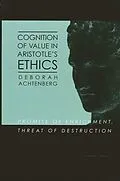With this new interpretation, Deborah Achtenberg argues that metaphysics is central to ethics for Aristotle and that the ethics can be read on two levels-imprecisely, in terms of its own dialectically grounded and imprecise claims, or in terms of the metaphysical terms and concepts that give the ethics greater articulation and depth. She argues that concepts of value-the good and the beautiful-are central to ethics for Aristotle and that they can be understood in terms of telos where 'telos' can be construed to mean 'enriching limitation' and contrasted with harmful or destructive limitation. Achtenberg argues that the imprecision of ethics for Aristotle results not simply from the fact that ethics has to do with particulars, but more centrally from the fact that it has to do with the value of particulars. She presents new interpretations of a wide variety of passages in Aristotle's metaphysical, physical, psychological, rhetorical, political, and ethical works in support of her argument and compares Aristotle's views to those of Plato, Marcus Aurelius, the Hebrew Bible, Hobbes, Rousseau, Kant, Freud, and twentieth-century object relations theorists. Achtenberg also responds to interpretations of Aristotle's ethics by McDowell, Nussbaum, Sherman, Salkever, Williams, Annas, Irwin, Roche, Gomez-Lobo, Burnyeat, and Anagnostopoulos.
Autorentext
Deborah Achtenberg is Associate Professor of Philosophy at the University of Nevada, Reno.
Klappentext
Argues that the central cognitive component of ethical virtue for Aristotle is awareness of the value of particulars.
With this new interpretation, Deborah Achtenberg argues that metaphysics is central to ethics for Aristotle and that the ethics can be read on two levels-imprecisely, in terms of its own dialectically grounded and imprecise claims, or in terms of the metaphysical terms and concepts that give the ethics greater articulation and depth. She argues that concepts of value-the good and the beautiful-are central to ethics for Aristotle and that they can be understood in terms of telos where 'telos' can be construed to mean 'enriching limitation' and contrasted with harmful or destructive limitation. Achtenberg argues that the imprecision of ethics for Aristotle results not simply from the fact that ethics has to do with particulars, but more centrally from the fact that it has to do with the value of particulars. She presents new interpretations of a wide variety of passages in Aristotle's metaphysical, physical, psychological, rhetorical, political, and ethical works in support of her argument and compares Aristotle's views to those of Plato, Marcus Aurelius, the Hebrew Bible, Hobbes, Rousseau, Kant, Freud, and twentieth-century object relations theorists. Achtenberg also responds to interpretations of Aristotle's ethics by McDowell, Nussbaum, Sherman, Salkever, Williams, Annas, Irwin, Roche, Gomez-Lobo, Burnyeat, and Anagnostopoulos.
Deborah Achtenberg is Associate Professor of Philosophy at the University of Nevada, Reno.
